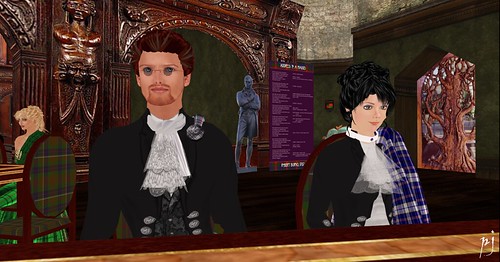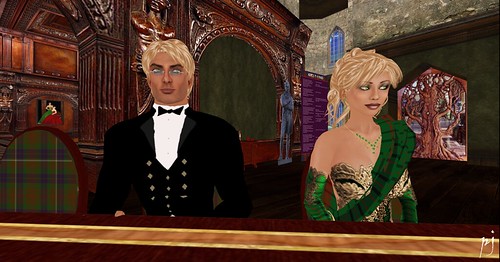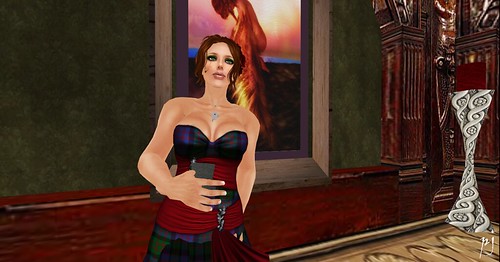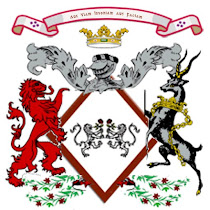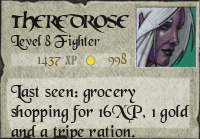I am pleased to share this wee video by Mab MacMoragh with you.
Address to a Haggis by Robert Burns from Mab MacMoragh on Vimeo.
I am pleased and honored that Mab desired to use Isle of Skye for this endeavor.
Enjoy!
Jan 29, 2011
Mab MacMoragh's Burns Machinima
Posted by Eva Bellambi at 8:34 AM 0 comments
Labels: Address to a Haggis, Mab MacMoragh, Robert Burns
Jan 24, 2011
Burns Night Supper and Ceilidh, 2011
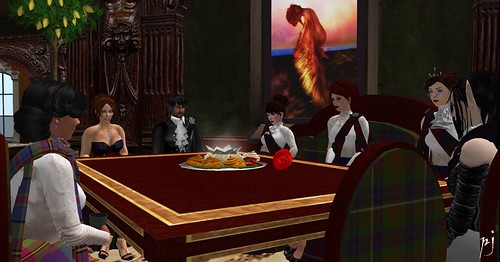
(l-r) Soliel Snook, Rowan Derryth, PJ Trenton, Gabrielle Riel, Eva Bellambi,
Kate Nicholas, and Serra Anansi
(photo by PJ Trenton)
Seneschal, My Lords and My Ladies, Ladies and Gentlemen. Please join with me as I toast the memory of Scotland's National Poet and the person whose life and accomplishments we celebrate tonight.
Many thousands of Scots around the world celebrate Burns night on his birthday, January 25th. It is perhaps extraordinary that there is a Burns Supper at all. Why do Scots the world over participate in "Burns Supper" to perpetuate the memory of their National Poet? Why do not other groups gather annually to celebrate the memory of the famous writers of their nations? Why for example is there no Dickens Dinner, Tolstoy Tea, Shakespeare Roast, or Balzac Barbecue -- or some other such event?It would be presumptuous to assert the answers to these questions. But, perhaps by reflecting on Robert Burns and his life we can discover some of our reasons for celebrating his memory tonight.Had Robert Burns lived today, his earnings from one song alone -- Auld Lang Syne -- would have made him a multi-millionaire on a par with writers as Irving Berlin and George Gershwin and performers such as Elvis Presley and Paul McCartney. Yet, when he died in 1796, aged thirty-seven, he was poor and asking financial help of acquaintances. So what was it then about the life of this fellow, born into a poor farming family and departed in poverty that brings Scots together each year to celebrate his memory?
Perhaps he was a Scottish "Everyman." Perhaps his writing spoke to the basic emotions, thoughts, desires and fears of every person regardless of nation or rank. People frequently attribute certain traits to the Scottish character. Primary among them are a down-to-earthness, a plain-ness, a directness, a fierecely independent spirit, and a common touch. Perhaps these traits have more universal appeal than is often appreciated. It is not possible to do justice to Robert Burns character in the time allotted. Perhaps a few examples of his character, as seen in his poetry, will do.
Burns loved people despite their weaknesses, but hated hypocrisy.
One biographer stated that the Reformer, John Knox, had more in common with Burns than with the stereotype we have of Knox today. He stated that Burns and Knox were desperate men of crisis who played their parts in opposition to false or abused authority. Burns' biographer wrote that had Knox seen the abuses of the Church at the time of Burns, he would have allied himself with Burns against the established Church and many of its pillars of the community.
In the poem, Holy Willie's Prayer, Burns pointed his barbed wit at a self-righteous, member of the congregation as an example of the kind of hypocrisy that can poison any institution. Holy Willie, by his own complaints and by church standards, is shown to be an example of what to avoid. He enumerates his own misdeeds, mentioning some of them by their first names and frequency in the week.
Burns was opposed to anyone being treated in a servile manner.
Robert Burns addressed his hatred of slavery in a poem, The Slave's Lament:
"It was in sweet SenegalThat my foes did me enthralFor the lands of Virginia, 'ginia, O!Torn from that lovely shoreAnd must never see it moreand alas! I am weary, weary, O!
"The burden I must bear,While the cruel scourge I fear,In the lands of Virginia, 'ginia, O!With the bitter, bitter tear,And alas! I am weary, weary, O!"
Burns loved Liberty.
Robert Burns wrote of himself: "The first two books I ever read in private, and which gave me more pleasure than any two books I ever read again, were The Life of Hannibal and the History of Sir William Wallace. Hannibal gave my young ideas such a turn that I used to strut in raptures up and down after the recruiting drum and bag-pipe, and wish myself tall enough that I might be a soldier; while the story of Wallace poured a Scottish prejudice in my veins which will boil along there Ôtill the floodgates of life shut in eternal rest."
Burns disliked superstition as a means by which people enslave themselves. However, he drew upon the rich lore of Scotland and its legends and fairly tales to produce symbolism in his poetry.
Burns loved learning.
A Burns biographer once wrote that it "was parish gossip that, if you called on William Burness at meal-time, you found the whole family with a book in one hand and a horn spoon in the other."
Burns inherited his parents love of learning, a yearning that helped him to keep an open mind about himself, his Maker, acquaintances, and his surroundings.
The traits that seem to mark Burns' character all point back to the inescapable fact that he was a Scot.
The stereotype of the Scotsman, thanks largely to Sir Walter Scott and Sir Harry Lauder, is a fellow wearing highland attire. In his life, Burns certainly did not fit that stereotype at all. From reading his poems we gain the picture of a lowland Scot who dressed "English" according to the style of a farmer. The book which contained most of Burns' poems, titled Poems, Chiefly in the Scottish Dialect, made a favorable impression on the literati of Edinburgh. I suppose we would call the literary critics of the time "Liberals" today. They found their theories about the sensitivity of the common man confirmed by what they called this "ploughman poet." Burns spent the winters of 1786-87 and 1787-88 in Edinburgh as a national celebrity, but he disliked the condescension with which he was treated and so returned to farming.
No, Burns did not fit the stereotype of the Highlander in his own life or in the image he projected to literary society. However, it is interesting to note that he penned at least one poem to sing of a displaced Scot:
"My heart's in the Highlands,my heart is not here,My heart's in the Highlands a-chasing the deer,A-chasing the wild deer and following the roeMy heart's in the Highlands, wherever I go!
"Farewell to the Highlands, farewell to the North,The birthplace of valour, the country of worth!Wherever I wander, wherever I rove,The hills of the Highlands forever I love."
We now toast Robert Burns! Lover of people, lover of freedom and liberty, lover of truth, lover of learning, a lowland farmer, a Highlander at heart, a Scot.
To Robert Burns!
Several other toasts followed as the crowd got into the spirit of things - and after the spirits got into them a bit more. :)
Posted by Eva Bellambi at 2:26 PM 0 comments
Labels: Burns Supper, Caisteal Teanacadh, Isle of Skye, Kate Nicholas, PJ Trenton, Robert Burns, Rowan Derryth, Serra Anansi, Winterfell Anodyne
Jan 15, 2011
Celebrating Burns Night on Isle of Skye - January 22nd at 7pm SLT
Robert Burns (25 January 1759 – 21 July 1796) (also known as Rabbie Burns, Scotland's favourite son, the Ploughman Poet, the Bard of Ayrshire and in Scotland as simply The Bard) was a poet and a lyricist. He is widely regarded as the national poet of Scotland, and is celebrated worldwide. He is the best-known of the poets who have written in the Scots language, although much of his writing is also in English and a 'light' Scots dialect, accessible to an audience beyond Scotland. He also wrote in standard English, and in these pieces, his political or civil commentary is often at its most blunt.
He is regarded as a pioneer of the Romantic movement and after his death became an important source of inspiration to the founders of both liberalism and socialism. A cultural icon in Scotland and among Scots who have relocated to other parts of the world (the Scottish Diaspora), celebration of his life and work became almost a national charismatic cult during the 19th and 20th centuries, and his influence has long been strong on Scottish literature.
As well as making original compositions, Burns also collected folk songs from across Scotland, often revising or adapting them. His poem (and song) Auld Lang Syne is often sung at Hogmanay (New Year), and Scots Wha Hae served for a long time as an unofficial national anthem of the country. Other poems and songs of Burns that remain well-known across the world today, include A Red, Red Rose, A Man's A Man for A' That, To a Louse, To a Mouse, The Battle of Sherramuir, and Ae Fond Kiss.
from the Wikipedia entry on Robert Burns
For in the works of Robert Burns we see the whole cosmos of man’s experience and emotion, from zenith to nadir, from birth until death.
Len G. Murray
Posted by Eva Bellambi at 8:54 PM 2 comments
Labels: Burns Supper, Isle of Skye, Robert Burns, Rowan Derryth, Soliel Snook, Winterfell Anodyne
Jan 26, 2009
Burns Night Celebration - Isle of Skye
I was pleased to host an intimate event last evening in my new home - my ancient familial homelands. We celebrated Rabbie Burns' 250th Birthday with whisky, haggis, story-telling, and poetry reading. There was plenty of commentary, laughter, and good cheer.
I believe Rabbie would have been pleased to have joined us.
Many good stories and wonderful poems were shared. Here is but a sampling:
From Mr. Burns:
- Address to a Haggis (Eva Bellambi)
- Scotch Drink (Eva Bellambi)
- A Tippling Ballad (Eva Bellambi)
- Auld Rob Morris (Eva Bellambi)
- Robert Bruce's March To Bannockburn (Eva Bellambi)
- The Gloomy Night is Gath'ring Fast (Exrex Somme)
- My Bonnie Mary (Exrex Somme)
 Ever the generous soul, Mr. Somme was trying to assure my comfort.
Ever the generous soul, Mr. Somme was trying to assure my comfort.also known as the danger of multipose cushions. :p
The King of Locahlin and His Three Beautiful Daughters (Hotspur O'Toole)
The Fool of the World and His Airship (Hotspur O'Toole)

Walking with Boudicca by C.Connelly (Eva Bellambi)
And finally:
[2009/01/25 20:56] Annechen Lowey: Reply From a Haggis by J. G. Farrell
[2009/01/25 20:56] Eva Bellambi grins
[2009/01/25 20:56] Annechen Lowey: O' Lady o' Skye, ye addressed me weel, Which so befits a hielan' chiel,
And tho' like you I'm far frae hame,
I sure achieved my share of fame.
[2009/01/25 20:56] Kara Timtam raises an eyebrow. A talking haggis?
[2009/01/25 20:56] Annechen Lowey: I never thocht I'd see the day, I'd grace a trencher doon this way,
In the brawest club in (Winterfell) toon, Tho' mony a mile frae bonny Doon.
[2009/01/25 20:56] Eva Bellambi smiles broadly
[2009/01/25 20:56] Exrex Somme is Offline
[2009/01/25 20:56] Annechen Lowey: Once fit for only rustic table, I now enjoy a five star label, No longer classed as peasant grub For now I grace the Skye's table.
[2009/01/25 20:57] Annechen Lowey: I'm sometimes scorned by snobbish folks, And the butt of corny jokes, Such folks and jokes are unco phony, Now I'm acclaimed by Egon Ronay.
[2009/01/25 20:57] Eva Bellambi laughs and laughs
[2009/01/25 20:57] Kara Timtam barks with laughter!
[2009/01/25 20:57] Annechen Lowey: The Power who made mankind her care, Set me above all other fare, For Scotland's sake I'll keep this place, An' aye be Chieftain of the pudden' race.
[2009/01/25 20:57] Nabila Nadir: ha!
[2009/01/25 20:57] Annechen Lowey: So to all you Braw Scots lads & lassies That here tonight I see, Uphold auld Scotias good fair name, And from me - "Bon Appetite"
[2009/01/25 20:57] Annechen Lowey: ...
[2009/01/25 20:57] Eva Bellambi: BRAVO!!
[2009/01/25 20:57] Nabila Nadir: excellent!
[2009/01/25 20:57] Kara Timtam: Haggis Abu!
[2009/01/25 20:57] Eva Bellambi: Oh wonderful!!Chatting with Mrs. Peterman at the end of the last poem.
Posted by Eva Bellambi at 9:43 PM 0 comments
Labels: Exrex Somme, Hotspur O'Toole, Isle of Skye, Nabila Nadir, Robert Burns
Jan 19, 2009
BURN'S NIGHT CELEBRATION ON THE ISLE OF SKYE
Celebrate the birth of the Bard of Scotland, Robert Burns, with me in my new lands in Winterfell Anodyne.
The ruins of ancient family home are still being excavated and rebuilt, but we shall sit around the fires underneath the starry skies, telling Celtic stories, and reading Celtic poetry (heavy on the Burns, of course).
Rest assured Nellie will be swimming nearby, and the haggis will be boiled. The Uisge Beatha will be flowing as the tales are told.
See you there!
Posted by Eva Bellambi at 10:30 AM 2 comments
Labels: Burn's Night, poetry, Robert Burns, Story-telling
Jan 25, 2008
The Bonney Bard of Scotland
Today at two distinct suppers, the good Citizens of Caledon will honour Scotland's favourite son, Robert Burns.
Robert Burns (25 January 1759 – 21 July 1796) (also known as Rabbie Burns, Scotland's favourite son, the Ploughman Poet, the Bard of Ayrshire and in Scotland as simply The Bard) was a poet and a lyricist. He is widely regarded as the national poet of Scotland, and is celebrated worldwide. He is the best-known of the poets who have written in the Scots language, although much of his writing is also in English and a 'light' Scots dialect, accessible to an audience beyond Scotland. He also wrote in standard English, and in these pieces, his political or civil commentary is often at its most blunt.
He is regarded as a pioneer of the Romantic movement and after his death became an important source of inspiration to the founders of both liberalism and socialism. A cultural icon in Scotland and among Scots who have relocated to other parts of the world (the Scottish Diaspora), celebration of his life and work became almost a national charismatic cult during the 19th and 20th centuries, and his influence has long been strong on Scottish literature.
As well as making original compositions, Burns also collected folk songs from across Scotland, often revising or adapting them. His poem (and song) Auld Lang Syne is often sung at Hogmanay (New Year), and Scots Wha Hae served for a long time as an unofficial national anthem of the country. Other poems and songs of Burns that remain well-known across the world today, include A Red, Red Rose, A Man's A Man for A' That, To a Louse, To a Mouse, The Battle of Sherramuir, and Ae Fond Kiss.from the Wikipedia entry on Robert Burns
Burns Night, effectively a second national day, is celebrated on January 25th with Burns suppers around the world, and is still more widely observed than the official national day, Saint Andrew's Day, or the proposed North American celebration Tartan Day. The format of Burns suppers has not changed since Robert's death in 1796. The basic format starts with a general welcome and announcements followed with the Selkirk Grace. Following the grace comes the piping and cutting of the Haggis, where Robert's famous Address To a Haggis is read, and the haggis is cut open. The event usually allows for people to start eating just after the haggis is presented. This is when the reading called the "immortal memory", an overview of Robert's life and work is given; the event continues with many toasts and some presentation of a selection of his works and usually concludes with the singing of Auld Lang Syne.
Posted by Eva Bellambi at 7:10 AM 1 comments
Labels: Burns Supper, Loch Avie, Robert Burns
Jan 20, 2008
Robert Burns Night Supper

All are welcome to join us in Caledon Loch Avie at the Conservatory a' Ghaidhealtachd for the celebration of a Burns Supper. There are two opportunities offered for celebration of this night. The Early Bird celebration from 12:00pm-3:00pm SLT, and the SL evening celebration from 7:00pm-10pm SLT.
Your hostesses will be Miss Soliel Snook at 12:00pm, and Her Grace, Eva Bellambi, Duchess of Loch Avie at 7:00pm. There have been many volunteers in the organization of these events from all of Caledon as well as Steelhead. Our thanks go out to them all.
A little information:The annual celebratory tribute to the life, works and spirit of the great Scottish poet, Robert Burns (1759-1796). Celebrated on, or about, the Bard's birthday, January 25th, Burns Suppers range from stentoriously formal gatherings of esthetes and scholars to uproariously informal rave-ups of drunkards and louts. Most Burns Suppers fall in the middle of this range, and adhere, more or less, to some sort of time honoured form which includes the eating of a traditional Scottish meal, the drinking of Scotch whisky, and the recitation of works by, about, and in the spirit of the Bard.
A general itinerary for both events will be as follows:
Welcome speech
Seating for dinner
Selkirk Grace
Entrance of the Haggis (with bagpipes)
Address to a Haggis - reading of poem by Robert Burns
Whisky toast to the Haggis
Supper
Loyal Toast
Immortal Memory - some history of Mr. Burns and his day
Words of Appreciation
Toast to the Lassies
Toast to the Laddies
Other Toasts
Readings of Burns' Works
Music of Robert Burns concluding in Auld Lang Syne
Céilidh
Posted by Eva Bellambi at 4:26 PM 1 comments
Labels: Burns Supper, Eva Bellambi, Loch Avie, Robert Burns, Soliel Snook





